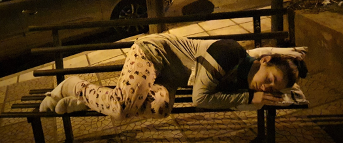
Phase I
My research started when in our Encounters group, we put the word ‘community’ next to the word ‘encounters’. 10 artists, about 10 months away from art, and therefore away from work, wondered how the last year is reflected. My interlocutors came from what is called in Greece ‘the free theatre’, which means artists working in theatres outside the National Theatre of Northern Greece, the National Theatre of Athens and the Municipal Theatres, outside, that is, the theatres funded by the state.
Used to act with others, together as a whole, in order for a performance to happen, the community of performing arts found itself in a difficult situation. Dancers, actors and actresses, live within the community of their art group. Like football players or members of an orchestra, they, too, are part of a whole. This community is normally on the road all day. They rehearse, read or write plays, look for funding, rehearse, move around the city with a backpack full of sweaty clothes and negotiate percentages with theater administrations, rehearse, put on performances and rehearse again. It was during one of those moments, probably during a rehearsal, that the lockdown happened.
A first round of quarantine online meetings showed we all agree on at least one point: the lockdown hurts. The bodies of dancers and actors, by abstaining from lessons and rehearsals, accustomed to an intense daily activity, ache.
As for all the rest, these social subjects have long felt like fish out of water. In the first quarantine it became common to watch actors, musicians and dancers practicing their art from home, with the aim of comforting, encouraging, inspiring and entertaining the audience, declaring a strong present. The arts were still there for us, even without a ticket, even from home.
Internationally well-known dance companies created videos, with their dancers adapting to the squares and traps of their homes, often in a light and comic way, while social reality became increasingly harsh, increasingly uncertain, in matters of labor, social security, health and healthcare and in the end, survival. In Greece, within a short time, a large number of artists lost their jobs. Productions were canceled, small art venues closed, dance and theater classes stopped, while the state remains, until now, silent on the demand for state support for art.
It is members of this community I have asked to tell me about the meaning of ‘inside’ and ‘outside’ during quarantine. The goal was to create a collective performance, which would consist of the distant voice, aesthetics and opinions of my personal community of performing artists.
To begin a dialogue, as a common starting point, I shared with them two texts I wrote.
‘Stepping into’ and ‘Dozens of lives in my room’ is my personal reflection on the ‘outside’ that was forbidden and on the ‘inside’ that was growing.
‘Out on the street, at night, during the curfew, when we do not go out, some people do. Apart from taxis and ambulances, who else is there? On the other hand, friends, relatives, books, movies, performances, memory, imagination, working hours, collaborators we do not like, the history of the world are now gathered at home. Lots of people for a few square meters, no matter how big a house one has’.
Stepping into
Going out of my place, out in the city, out where the wind blows, it’s December, already.
Going out into the silence (‘the streets aren’t for dreaming now’), I fly over.
I see the night birds hiding under the passerby’s coat, cold cold moon.
Behind the street lamp there is a dawn of a day.
And still no sign
I listen to the rhythmical sound of shoes
Hurrying down the highway
The quiet humming will soon fade
I wave back at the man and turn my head to the clouds
I’m not sure I remember how I got here, in the first place
–Choreographing the city, during curfew hours
Dozens of lives in my room
As I pass across my bedroom an old woman lies resting in my bed. Never seen her before and she seems to feel like home. Outside my window a little boy climbs up the branches of a tree I never knew it existed. On my kitchen table there is soup waiting not for me and a mom cuts my bread with her always loving fingers. A man passes right next to me, pushes me aside and says ‘excuse me’. Then, he plunges his hand in his pocket, takes out a hanky and wipes his nose. My living room is crowded with people. I see an old man digging in my drawers, throwing my books off the shelves, he is anxiously looking for something. He is spitting out words from the past, he is ugly as hell and smells like a shipwreck. Along the corridor and in the bathroom, there are men and women, some of them blurry portraits of an unknown painting, others sly market people, gossipers and talkers, their man-eating tongues ready to lick and swallow anything that comes their way. An old beggar, a poor one-legged devil, what is left of the War, whispers for a penny. Then, he jumps on my desk and sings “L’Internationale”. On my couch a woman shows her beauty and a poet dies of his broken heart. All my belongings are thrown out of the window, for the rebels to build barricades. Whatever is too heavy the younger ones burn it down to a big fire that lightens up the house. I sit nearby and warm my hands.
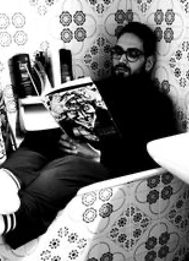
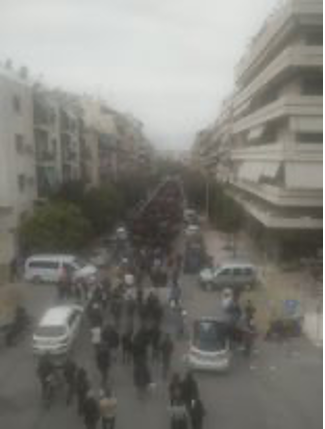
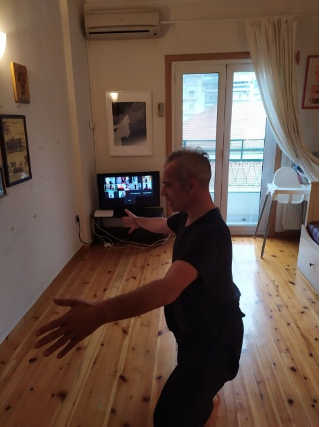
Phase II
“I really want to participate in your research, really, I just don’t know what to say … nothing comes out.”
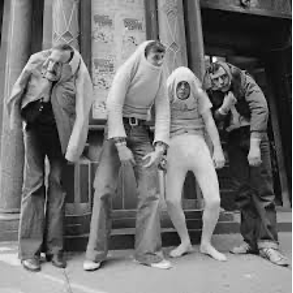
I then began to collect raw material from the isolated artists. Their thoughts through images, texts, music, videos, in relation to the quarantine period, which would constitute a deconstructed performance. There was an automatically positive response to my call and true joy that, even so, under these circumstances, we would collaborate again, coexist in an imaginary project, an intangible performance.
All this, everything that we finally collected, in a different case would compose a performance, which would take place in Athens or Thessaloniki, probably in a theatre or another art venue. Now, and since due to covid restrictions we lack the unifying factor of acting together, they will probably remain unrelated parts, excerpts, of an intangible whole. Being accustomed to the physical- as opposed to the digital- spaces and to a job in which ‘encounters’ entail physical contact, action-reaction and interdependent timing, switching to the digital world, left my personal community of performing artists with the bewilderment of lack of object.
After the first positive response and until the material was collected, the conversation between us in most cases shifted to the lack of creativity, the difficulty in coming up with a material they would like to deliver to me and the fact that they would nevertheless give me something, even if it was not what they wanted. This period is characterized by all the informants as unproductive in terms of artistic creation. One of the main reasons, according to them, is the severity of social developments in Greece and the anxiety of the sudden change in their situation along with their economic deterioration and often the poverty status in which a large number of artists found themselves, with the prolonged cessation of any artistic activity.
Ιn contrast to the stagnation of the physical artistic presence, the acceleration of the digital transformation of the world with the outbreak of the pandemic and the conceptualization of economic and social life through digital platforms give the feeling of a speeding up world, in which the performing artists hover somewhere in between: the earth and the sky, the old and the new, reality and art, the stage and the zoom windows.
Denial, withdrawal, silence is certainly not a dynamic response to the developments of the last year, still it is a record of a specific reality. The interpretation of the ‘nothing’ of the pandemic will be made in art, perhaps, later. With a long period of covid-19 behind us and a distance of months from the initial observations of this project, artists in Greece are now giving a dynamic presence, linking artistic creation with social intervention, much more strongly than at the beginning of the pandemic. Orchestras and choirs, dancers and actors go out into the public space, not to entertain and encourage as in the early days of the pandemic, but to make their voices heard in society. The public voice of artists has been heard lately in demonstrations and initiatives to support unions or theatres that are closing down. It seems that individual silence encounters a collective voice.
This project is an observation and documentation of the quarantine and lockdown period through conversations with 10 performing artists and their artistic response to the questions: ‘the inside and the outside’, ‘your community’, ‘dancing the restricted body’. The photos and videos I present here are part of the answers to these questions and my interlocutors’ initial ideas for the planned performance.
For now, it is a work in progress, until the creators decide whether the performance will be completed in a physical space or remain open in its current fragmentary and incomplete form.
Inside, Outside:
In my head chaos is dancing
Some more answers:
Inside-Outside:
“12:30, after midnight. It should not be as quiet outside as inside me”
“Hide and seek”
“A veil covers us”
“Let the menhir (a single standing stone) leave our shoulders”
Your community:
“All nomads, trying to find a place, to set up their camp in the next village.
And everyone with their noble desire”
“You either love or you do not love. Love is as rough as life itself. And then you dance with your heart!”
Dancing the restricted body:
“From anger to resignation, from resignation to stubbornness, from stubbornness to madness, from madness to silence, from silence to rest, from rest to decision and round and round”, “Body and spirit a broken waltz”
I wholeheartedly thank the artists for their contribution: Konstantinos Gerardos, Pepi Kei, Michail Nikolaou, Konstantina Hatzopoulou, Kiki Karaiskou, Nandia Dalkyriadou, Aggeliki Chatzi, Zoi Kollatou, Stavros Kottas, Jenny Karaviti.
0 Comments